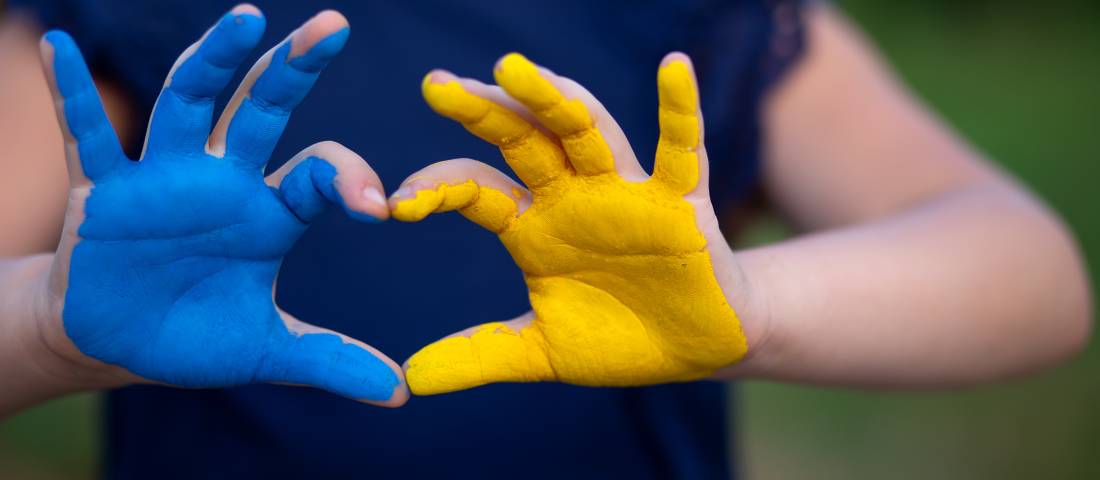The news of the unfolding situation in Ukraine will be front of mind for many of us at the moment. Regardless of your political viewpoint, it is clear to see that this is a humanitarian crisis - and one which is deeply affecting families just like ours.
Here at tiney, we’ve been working closely with mental health expert and solution news journalist Jodie Jackson to provide some perspective on how to begin the difficult task of navigating some of the inevitable questions and challenging conversations that may well arise in your home over the coming weeks.
Jodie’s message is that first of all, we need to understand that the news itself is incredibly negative. Problem driven news reporting commonly brings us headlines of failings, pain and problems. But these articles sell papers and gain public attention. Stories of humanity, hope and progress don’t necessarily sell quite as well. This is summarised well by Jodie when she says, “The news does not reflect everything that goes on; it reflects everything that goes wrong.”
But, we know too that this news is also important. Unless we are made aware of problems, we are not in a position to do anything about them. It’s a fine balance as too much negative press becomes overwhelming, leaving us unable to think clearly.
We need to be able to frame our thinking, and to allow ourselves to step back and have conversations in healthy contexts.
As adults, we are already aware of how exposure to articles and videos can lead to preoccupation, anxiety, worry and feelings of overwhelm. Factor in children’s worries and perceptions about a situation and it can be difficult to know where to begin.
The truth is, children are exposed to the news from an early age. With the best of intentions, there is little we can do to change that. But should we be trying to?
Some advice does indeed recommend shielding children entirely from the news, but inevitably this is very difficult to do in practice, where snippets of video, audio or conversations might be heard throughout the day. In any case, Jodie believes that it’s not ideal to shield children from any awareness of the problems in the world. This in itself can be harmful. Instead, she encourages a middle ground where instead we seek to reframe the news environment that children exist within.
So how do we help children to make sense of the news, without becoming totally overwhelmed by it? Here are some ideas:
Think about who you are talking to.
Is it your own child, or a child you are caring for in your setting? It’s an important question because it will bring slightly different answers:
With your own child, you’ll know the boundaries that feel comfortable for you and for them. For parents we would advise not shying away from the conversation, but deepening your understanding, and theirs if it feels right at that moment. In fact, by bringing up difficult themes and topics, what we are doing is ensuring that difficult information does not creep up on children by surprise, but instead that they can begin to process it in a supported environment.
As a childminder, our advice is a little different, because it’s not necessarily your responsibility (nor may it meet the desires of the parents) to be having those difficult conversations. In this role, your focus should be more about ‘supportive responses’. Holding space for the children to share with you their understandings, their thoughts and perhaps even their concerns. We would always encourage open and honest conversations with all the families you work with to take time to understand each family and their wishes.
Before having any conversations, pause and take the time to find out what the children already know and how they are feeling.
Every child will have different amounts of understanding and no two children will feel exactly the same.
Keep in mind that challenging topics can stimulate feelings of fear and anxiety. Check in with exactly what the fears are, so that you can respond appropriately.
It’s ok to not have magic answers to ‘fix’ the problem for them.
In fact, it’s ok to not have answers at all. There’s no shame in admitting we aren’t sure how to answer a question and it’s much better to promise to listen and go away to find an answer, than to stumble through in the moment and possibly make things worse. Children value being heard, just like adults do. It’s powerful to let them know you’re listening.
Be aware that it’s up to us to respond to children’s observations in a sensitive, sensible and empowering way.
Try to support children with responses that help them to process what they hear. Focus on age appropriate conversational language. Be mindful of the words you use. Words like ‘challenging’ or ‘troubling’ may be better than words like ‘scary’ when you are trying to explain something. Try to use positive language too, in a context that fits the conversation. Move the conversation to take place using words like, ‘helping’, ‘teamwork’, ‘rescue’, ‘care’, ‘healing’, ‘friendship’, ‘protect’ and ‘peace’. Try to find stories that use demonstrations of this language in order to create some balance.
Remember that often children need context, and they need hope.
Widen the media lens and find examples of positive news from within the sadness. Use platforms such as Squirrel news, Future Crunch or Positive News to inform yourself first.
Acknowledge that the problem that’s causing them pain is an appropriate feeling, and validate those feelings and emotions for them. Remind them that we can always find information that proves things are being done to try to resolve a problem and to provide help. Respect and remember history - the problem is not the end of the story. War is a terrible thing but if we look back in the past, peace and progress always wins.
Help children to actively seek solutions.
When problems occur, always make one question your starting point - ‘Is anybody doing anything about this?’ In any situation, there is almost always someone somewhere doing something to try and make it better.
Draw attention to the positive work of others. Rather than shielding them from the pain, show them what can be possible when kindness and love spreads widely.
Help children to feel empowered by taking action in a way they can control.
This could be fundraising to make a charity donation, donating clothing, food or supplies to local hubs or even by getting children to make thank you cards or pictures for those helping. Research proves that feelings of anxiety can be balanced by feelings of being in control, and by taking small, active steps in our own communities, children gain a sense of belonging and take pride in the fact they are helping in a real way. Feeling part of the solution can bring children (and adults) a great deal of self worth and value. In our app, there’s a collection of tiney tips related to Jodie’s story of ‘Little Ruffle’ that provides ideas to address some of the ‘big feelings’ that will arise alongside these topics.
Protect your own mental health. You can’t pour from an empty cup.
Firstly, manage your own media diet and create healthy boundaries. Avoid ‘Breaking news’ and instead limit when and how you access news articles (ideally no more than once a day). Absorb ‘slow news’ articles that bring together a full picture of information rather than snippets that don’t. This will help to give you clarity of thought.
Consider your sources for news and don’t feel guilty for switching off. It’s self-care and it’s important.
Take the time to reconnect with yourself. Jodie shared a wonderful meditation (which you can access on her website) to calm and refocus anxious feelings. Why not spend 5 minutes trying it out?
Don’t feel guilty for enjoying simple things or having fun.
The best thing we can do for all the children in our care is to spark joy in the everyday and play, play, play. Let’s normalise that first and then we can take on the world!
Huge thanks to Jodie for her input and time. If you would like to see more of Jodie’s work, as well as see resources for supporting children through these difficult times, then why not visit www.littleruffle.co.uk to find out more. Jodie is also in the process of launching The News Literacy Network to further support Parents, Carers and Practitioners navigate the ever changing world we live in. We will bring you more on this as soon as it’s ready.







